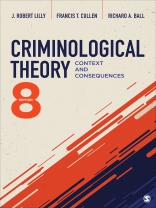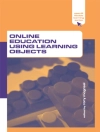Offering a rich introduction to how scholars analyze crime,
Criminological Theory: Context and Consequences moves readers beyond a commonsense knowledge of crime to a deeper understanding of the importance of theory in shaping crime control policies. The
Eighth Edition of this clear, accessible, and thoroughly revised text covers traditional and contemporary theory within a larger sociological and historical context. The latest edition includes new sources that assess the empirical status of the major theories, a new chapter on Black Criminology, and expanded coverage of important perspectives, such as the explanation of white-collar crime and the relationship of immigration and crime.
Included with this title:
LMS Cartridge: Import this title′s instructor resources into your school′s learning management system (LMS) and save time.
Don′t use an LMS? You can still access all of the same online resources for this title via the password-protected Instructor Resource Site.
İçerik tablosu
Chapter 1. The Context and Consequences of Theory
Chapter 2. The Search for the ‘Criminal Man’
Chapter 3. Rejecting Individualism: The Chicago School
Chapter 4. Crime in American Society: Anomie and Strain Theories
Chapter 5. Society as Insulation: The Origins of Control Theory
Chapter 6. The Complexity of Control: Hirschi′s Two Theories and Beyond
Chapter 7. The Irony of State Intervention: Labeling Theory
Chapter 8. Social Power and the Construction of Crime: Conflict Theory
Chapter 9. The Variety of Critical Theory
Chapter 10. The Gendering of Criminology: Feminist Theory
Chapter 11. Crimes of the Powerful: Theories of White-Collar Crime
Chapter 12. Bringing Punishment Back In: Conservative Criminology
Chapter 13. Conservatism in Context: Contemporary Developments
Chapter 14. Choosing Crime in Everyday Life: Routine Activity and Rational Choice Theories
Chapter 15. The Search for the ‘Criminal Man’ Revisited: Biosocial Theories
Chapter 16. New Directions in Biosocial Theory: Perspectives and Policies
Chapter 17. The Development of Criminals: Life-Course Theories
Chapter 18. Black Criminology: Theories of Race and Crime
Yazar hakkında
Richard A. Ball is Professor Emeritus at Pennsylvania State University. He received his doctorate from Ohio State University in 1965. He served as Program Head for Administration of Justice for the 12-campus Commonwealth College of Penn State and earlier as Chair of the Department of Sociology and Anthropology at West Virginia University. Professor Ball has also been a member of a number of editorial boards and an officer in different professional organizations. He has authored several monographs on community power structure and on correctional issues, and he has coedited two books on white-collar crime. He has authored or coauthored more than 100 articles and book chapters, including articles in the American Journal of Corrections, American Sociological Review, The American Sociologist, British Journal of Social Psychiatry, Correctional Psychology, Crime and Delinquency, Criminology, Deviant Behavior, Federal Probation, International Journal of Comparative and Applied Criminal Justice, International Social Science Review, Journal of Communication, Journal of Contemporary Criminal Justice, Journal of Small Business Management, Journal of Psychohistory, Justice Quarterly, Northern Kentucky Law Review, Qualitative Sociology, Rural Sociology, Social Forces, Social Problems, Sociological Focus, Sociological Symposium, Sociology and Social Welfare, Sociology of Work and Occupations, Urban Life, Victimology, and World Futures. He is Sage coauthor of House Arrest and Correctional Policy: Doing Time at Home (1988). His work extends beyond criminology to include philosophy, history, and cultural analysis as well as organizational dynamics and evaluation research. He has done cross-cultural field work, served as chief, Central Testing Branch, U.S. Army, and worked in both state and federal correctional institutions. In 1996, he collaborated on the production of the television documentary A Year and a Day dealing with prison history. His honors include the Outstanding Researcher Award at West Virginia University and the Outstanding Scholar Award at Penn State. In 2014, his name was engraved on the Scholars Wall at Potomac State College as one of eight graduates of Potomac State to be so honored during the 100-year history of the institution.












